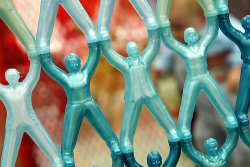 Stopped at a light one Saturday morning, I met some teenage girls and their mothers with buckets requesting money to send the girls to basketball championships. My first reaction was annoyance, but I decided if they needed it enough to ask, I could definitely spare some change. This sort of haphazard attitude has been the norm for my charitable giving by default. People and organizations that ask are generally receiving from me in some way, yet having the money flow in such a piece-meal fashion never makes me feel like I am really making a difference.
Stopped at a light one Saturday morning, I met some teenage girls and their mothers with buckets requesting money to send the girls to basketball championships. My first reaction was annoyance, but I decided if they needed it enough to ask, I could definitely spare some change. This sort of haphazard attitude has been the norm for my charitable giving by default. People and organizations that ask are generally receiving from me in some way, yet having the money flow in such a piece-meal fashion never makes me feel like I am really making a difference.
I used to feel like it was better to give something other than money. Not sure where this idea came from, but it was somehow laudable for an organization to request a volunteer or material goods, but asking for money was in a different category altogether. I realize that money is really one of the most efficient ways to meet a need, yet I still find myself harboring these thoughts on occasion, like at that stop light.
These ideas all came to the forefront as I watched the documentary I Am by film director Tom Shadyac. After a painful and near death experience, the once comedy driven Shadyac determines he wants to make a statement to the world. Unsure of what he wants to say, he interviews many prominent thinkers about what’s wrong with the world and bits of their wisdom fill the film. It’s a feel-good experience to see it, though his work is not necessarily balanced or critically analyzed.
The film explores the inner-connection between all living organisms on the earth. He found studies on elk showing nature using cooperation, not just competition, to meet group needs. For instance a herd determines when it will visit a watering hole not by following the alpha male, but by majority consensus seen in turning their head toward the hole – at the point 51% have turned toward a particular watering hole, the entire herd moves there. Another fascinating example was watching the electromagnetic waves emitted from a petri dish of yogurt (with live bacteria) in response to Shadyac’s thoughts going from normal to stressful as he turned thoughts toward his agent, ex wife and lawyer.
But most profound to me was a discussion between Shadyac and his late father who played a formative role with entertainer Danny Thomas in founding St. Jude Children’s Research Hospital. The two talked about the financial model for St. Jude and whether it was a viable one for other endeavors.
The hospital is known for both its pioneering research and treatment for catastrophic children’s disease and its policy to not require patients to pay beyond insurance (if available) for care, housing, transportation, etc. It’s a remarkable prospect, particularly when you consider the hospital costs $1.6 million per day to operate.
According to the hospital, approximately 71% of that cost is provided by public contributions and only 15% by insurance recovery and 14% from grants. These numbers to me are astounding in both how willing others are to help out and the amazing results that can be achieved through such cooperation.
I’m amazed that we can do something so great as this as a group of humans, and then I’m equally confused at why we don’t use this power to solve other problems. Spare change seems like a literal drop in the bucket for what we could be accomplishing, but the vastness of the problems overwhelms me. What makes this hospital unique in its ability to secure that kind of massive public contribution? Are there other ways we humans could cooperate more and other results we could achieve?
I have been thinking about this all day. Pretty intriguing questions. Now answers yet, at least from me.
It’s getting 51% of the herd to turn heads that’s the problem, I think.
I was thinking about the whole double earring pierces the other day, not to try to dreg up some tired issue, but to really figure out why so many people could easily get on board with the earrings rule but not necessarily agree about ways to help OTHER people. It felt like we have a much easier time acting independently and individually than coming together. Is it because we feel like we have to share a vision 100% with our group members? Maybe I need to lower my expectations about what certain groups will accomplish … basically, not expect charitable groups, for example, to share my ideas completely in order to receive my support.
Good thoughts.
Interesting post! I’m reminded of an article I read a few years ago on Slate, I think after the 2004 earthquake/tsunami that hit Indonesia and other countries. The author said that research suggests that when people give more money in response to an acute problem like this, we largely do it by reducing how much we give for more chronic problems like St. Jude’s addresses. I don’t recall if the author reached this conclusion explicitly, but to me the rather depressing point was that we’re pretty much fixed in how much we’ll give. All crises do is reallocate our giving.